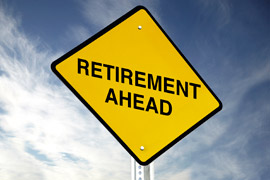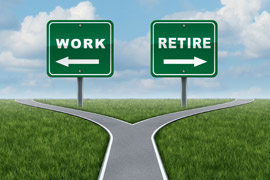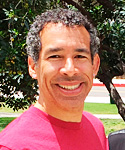June 16th, 2016
When Is It A Good Time to Retire?
Scott Cuyjet, RN, MSN, FNP-C
I am only 47 years old, but I have been thinking about retirement. It’s not that I want to retire now, but when is a good time? I have been working for the same company for 17 years, and the idea of spending another 20 years there before reaching retirement age seems daunting. So, how long should I wait?
One consideration is money, of course. The longer I wait, the more income I will have per month. According to the Social Security Administration, “If your full retirement age is older than 65 (that is, you were born after 1937), you still will be able to take your benefits at age 62, but the reduction in your benefit amount will be greater than it is for people who were born before 1938 […] If you start your retirement benefits at age 62, your monthly benefit amount is reduced by about 30 percent.”
 Another consideration is performance: Do I wait until I can’t do my job as well, or do I get out while I am still at the top of my game? I read an article recently that addressed this theme, but on the topic of when to stop driving. It is about seniors being in control of when they stop driving by thinking about it ahead of time and discussing it with family, in contrast with having someone else make the decision for them, which can cause embarrassment.
Another consideration is performance: Do I wait until I can’t do my job as well, or do I get out while I am still at the top of my game? I read an article recently that addressed this theme, but on the topic of when to stop driving. It is about seniors being in control of when they stop driving by thinking about it ahead of time and discussing it with family, in contrast with having someone else make the decision for them, which can cause embarrassment.
So, when is it a good time to retire? And what are the implications of this decision as a healthcare provider?
First, sometimes, we become aware that we are no longer at the top of our game, and this could affect the quality of our patient care delivery. It is one thing to forget the details of a diagnosis or treatment we rarely see, which is normal unless you are gifted with a photographic memory, but yet another to forget things that are common knowledge or routine practice for clinicians (e.g., forgetting to get a complete history, forgetting to document something you talked about with a patient, or ordering the wrong medication or the wrong dose). If our coworkers notice our performance slipping, they may or may not say anything to us or to our supervisors in order to protect us. If they do not speak up, this often forces them and others to have to compensate for us, and this can put patients at risk.
 Second, according to The National Institute for Occupational Safety and Health, “One in every five American workers is over 65, and in 2020, one in four American workers will be over 55, according to the U.S. Bureau of Labor Statistics.” A mass exodus of retiring workers, who subsequently also need healthcare as an aging population, could simultaneously leave healthcare without many of its providers while adding to the load placed upon it. Older, experienced providers also frequently play important roles as leaders and mentors, and without them we may wind up with a less-experienced healthcare workforce, which could also have negative consequences for patient care.
Second, according to The National Institute for Occupational Safety and Health, “One in every five American workers is over 65, and in 2020, one in four American workers will be over 55, according to the U.S. Bureau of Labor Statistics.” A mass exodus of retiring workers, who subsequently also need healthcare as an aging population, could simultaneously leave healthcare without many of its providers while adding to the load placed upon it. Older, experienced providers also frequently play important roles as leaders and mentors, and without them we may wind up with a less-experienced healthcare workforce, which could also have negative consequences for patient care.
Retirement does not have to mean stagnation. With some planning, a healthcare provider could do something that utilizes a different skill set, such as teaching. We could also go back to school to learn a new skill. Another temporary option, which I have chosen recently for myself, is to simply cut back on the amount of work time. I went from working a 5-day week at 100% to a 4-day week at 80%, and this may help keep me going for a few more years while I think about my options. In the end, I think a little planning can make for a smoother transition, as opposed to waiting for life to give us a swift kick in the gluteus.
If you have any advice on how to know when it’s time to retire, as a healthcare provider or otherwise, and how to do it gracefully, I’d appreciate your comments.




I’ve considered the question about retirement frequently. Like you, Scott, I am an advanced practice provider (APP) working in the Bay Area. Moreover, I will also be part of the 20% of work force participants over the age of 55 in 2020.
Unlike many APPs, I landed a FT job in medicine that provides me an actual pension. Moreover, I will be eligible to access that pension less than two years from now – at age 59. However, just because I can take advantage of a retirement pension doesn’t mean I will stop working. Why? Because I don’t want to. Ever.
In fact, at 59 years old, I anticipate that I will be studying for my third advanced practice national certification (!) and will be sending out resumes to interview for a new APP role. If the stars align, I hope be a newly minted PMHNP -BC at 60 years old. I also hope my 20+ years of APP experience, coupled with a lot of luck (and perhaps some charm), will get me hired. Somewhere. Anywhere.
Why? Just because we can stop working doesn’t mean we should. Early in my APP career, I was affiliated with an NP-run developmental clinic for high-risk infants. One of the pediatricians at the clinic was solidly into her 70s – and was still seeing patients! This doctor was rumored to be living in a senior retirement setting, but one day weekly she rose early, dressed for work, left the senior home and came to the clinic evaluate patients. Seeing that physician still at work in her mid-70s really impressed me and I remember thinking: “That’s who I want to be when I grow up.” Think of it: while the majority of the MD’s co-residents were enjoying their leisure time at the home, she was using her clinical skills and providing an invaluable service to her infant patients and their parents. In my mind, that sure beats a day trip to Filoli Gardens or a walk through the mall or even paying discounted senior rates to see a movie.
We APPs have a skill set that is valuable, difficult to attain and provides a much needed service to the greater population. Why discard the opportunity to serve? Or, more selfishly, why toss your skill set and start the slow journey to mental obsolescence? As you elegantly state in your piece, Scott, who will mentor once we’ve gone? Who will provide the guidance to the younger APPs seeing a “what the heck is THAT?” condition in a patient? We well-seasoned providers play a very valuable role in the workplace and our less experience colleagues really benefit from our “wise eyes” – presbyopia and all!
Maybe the best solution is to work a few days a week, enjoy a long weekend and return to work rested and ready to serve. There may be a compromise between working 40+ hour weeks (which I still do) and abandoning APP work completely. My advice to APPs considering retirement: think twice. Once out the door you may never have the opportunity to re-enter.
Sara,
Thank you for reading my post. I appreciate your thoughtful response. I have fortunately, at least for now been able to switch to a four day work week with Monday’s off to enjoy a long weekend as you say. It just started this month so I will see how it goes. Even with this little change I was concerned about what I was going to do if I wasn’t working. I fortunately don’t take sick time and don’t vacation much. I think that is the other area I will change, taking more time off throughout the year. With these changes in place I think I will continue to work as long as I can cause I enjoy the camaraderie and helping people.
Scott
When to retire? Assuming finances are not the driver, retire when you stop enjoying what you do! I am over 70 and still see patients 20 hours/week.
Edward,
Thank you for reading and taking the time to reply. That is a good strategy as well.
Scott
I don’t really think about this topic much.. I’m a pharmacist who has already practiced 36 years, and I’m 61 years old now.
I hope to practice until I am physically and mentally unable to do it effectively, and fortunately the work settings for pharmacists are increasing if you are specialized in an area of medicine and have advanced certifications or credentialing in a specialty, like HIV or ID.
I think I will know when the cobwebs make me a risk rather than a benefit, but until then I will be trying to make a difference somewhere.
Regardless of when I “retire” from pharmacy I will be doing my best to find employment elsewhere, probably doing something less mentally but more physically challenging…. not only to make an income, but to maintain health.
If I have to choose be sitting at home and getting out and doing manual labor, I would choose manual work any day.
I think we all spend way too much time an energy thinking about retirement. The very word “retirement” shifts the focus to “me”. I think the essence of a fulfilled life is realizing it is about much more than just me. My hope is to make the greatest difference in the lives of others after I turn 70 years old.
If I get my wish I will relocate to an urban area in the southeast somewhere to join a team of people who are still battling the HIV epidemic…an area of the country where HIV transmission is not well controlled and the need for healthcare is great.
There has to be a clinic who can use a pharmacist who is passionate about helping manage that disease. I’m that pharmacist.
Oh… and retirement… sure, I will draw the checks whenever they say I have to, but most likely I’ll just consider it an old age bonus, and give most of it away.
There are so many needs out there greater than mine…. at least that’s how it seems to me now. Let’s hope that’s how it is when, or if, I reach that golden age!
Rod Gordon, R.Ph.
Ron,
Thank you for reading and I love your reframing of retirement from “me” to the greater “we”. I guess more than a retirement plan you have a future plan. I was just thinking I have reached a place where I am settled and stopped planning for the future. If there is no plan than one has to just adapt to change which can be more painful than a planned change.
It is also great how you will consider your retirement money an “old age bonus” and will again, thinking of the greater “we”, give it away.
Scott Cuyjet
I am a 66 year old family physician in the UK and also wonder when I should hang up my boots.
I have cut down to 2 and a bit days a week and don’t do on call. The job is stimulating and at times difficult. I have pondered if my colleagues will tell me when I should go – hopefully I will remain mentally able but who knows? Will I know?
There is a school of thought which says that working is one of the best ways of keeping mentally fit and the combination of medicine and dealing with people can be particularly challenging for the brain; mine at least!.
So my idea at the moment is to keep going as long as feasible albeit part-time. If you like contrast then working some of the week is a good way to achieve it – I love my time off as well as the work – the latter most of the time!
John Salmon
John,
Thanks for reading and your thoughtful reply. I appreciate your insight and agree with the use it or lose it philosophy. Out of respect co-workers may not tell you directly but they may go to a supervisor. I am worried that I will lose the mental capacity to recognize that I have lost the mental capacity to do my job well and safely. I also hear you about the part time. Maybe I will just slowly pare back over time. Also, if it gets too difficult maybe I will also look for something less challenging.
Scott Cuyjet
I retired at 62 from a busy anaesthetic practice this meant that I was able to plan my departure.my surgeons anaesthetic group and family were able to make plans. To retire you have to be debt free a my income is uncertain .one simply has to live within ones means. My wife and I are very busy not an endless holiday . We are organising to build a house we can retire into and stay in should some mobility problem occur.we are reducing the amount of garden to care for by selling our current house.we help our children with baby sitting and their homes. It is so busy that it is not possible to imagine still working. I had no problems at work and was confident in my own practice or assisting others with critically ill patients.in my case choosing a time was very important.to have more family time a priority.you never know how long or how well you or your family will be. My registration ends in a few days .being an anaesthetist was my occupation I really enjoyed it and was very comfortable in that role ,but I am a father husband grand parents etc and these roles are enduring and I have tried to maintain the when working .my family talk to me.i am content.retirement is not a financial plan it’s social with a budget.
If you are reading the comments check out this timely article that was just sent out via MedlinePlus.
Many Seniors Saying No to Retirement: Survey also found many will change careers late in the game
https://www.nlm.nih.gov/medlineplus/news/fullstory_159457.html
I retired from a 600 bedded multispeciality Govt. Govt Hospital as it’s Director & HOD of Medicine. I am now 63+. I chose to get engaged with a lighter job, purely out patient and without any emergency call . Of course working almost 10 – 12 hours a day 6 days a week. But I feel I will cut down to 5 days a week. I have passed two certificate courses of almost 3 years duration after I got retired.
Wow Dr. B. Panigrahy you stepped down to 10-12 hours 6 days a week. That is still a crazy schedule. I guess it is all relative. As I mentioned in another reply, use it or lose it. You must really enjoy what you are doing. I will keep this in mind as my time nears.
Thanks for reading and for taking the time to reply.
I am retired at age 62, with no regrets.
After 40 years of intense advanced practice nursing/ medicine, it is time to smell the roses, not to just be planning the garden or planting the roses!
I want to have decades of pleasure, relaxation and fun before I develop a chronic illness or die.
I was a Hospice nurse from 1980 for nearly a decade and saw too many patients die before they had time to “retire “!
I am happy to consult with younger colleagues, call me anytime. I am happy to share my wisdom.
But now is the time for me to enjoy life, learn new ways of fulfillment, and to spend true quality time with friends and family.
Each of us needs to decide for themselves. But healthcare is only a part of who I am. I deserve to fully nurture those other parts that have been neglected as I cared intensely for others. Especially for my family…
To each his own…but don’t forget to smell the roses…deeply and profoundly.
I retire in one week at age 69.
I hope to make a positive choice for other roles outside of medicine instead of being forced out by illness or other pressures.
There are a lot of older practitioners in GP in this country who historically worked very long hours.
Acquiring new skills requires gradual learning over time. I hope I have done that as I have gradually ‘re drawn’ what I do. I’ll find out when I get there.